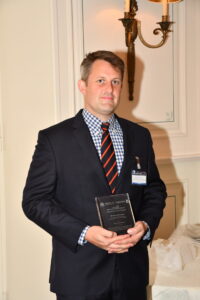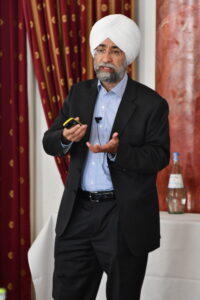From an economic perspective, 2023 posed significant challenges due to its stubborn, high inflation and geopolitical shocks. But there were also amazing advances in technology; machine learning and generative AI became the focal point for many sectors – including finance. Additionally, sustainability and engagement came under attack in the US, and ran into regulatory obstacles in Europe. By reflecting on Inquire Europe’s highlights this year, we see how the research themes can be constructively applied to the macro environment.

In January we looked back at Laurens Swinkel’s research that he presented at the autumn seminar from October 2022, ‘Empirical evidence on the ownership and liquidity of real estate tokens’. In this research he tries to understand real estate tokenization in a real-world practice: “There are several existing studies on the theoretical possibilities of tokenization, but very little has been researched on what happens in the real-world practice of tokenization. I was interested in multiple questions: after being tokenized, how many owners does the average residential property have? Do token investors use their fractional ownership to create diversified real estate portfolios? How liquid are individual residential properties after tokenization? Are prices of tokenized assets related to economic fundamentals of the investment? My conclusions have revealed a bit more about the real estate token market – about which there was previously very little known. I am enthusiastic because what I have learned exceeded my expectations, and there is a lot of space to expand upon my initial findings.”
Click here to read more.

In spring, we hosted a seminar in Malta, our second in-person seminar since the start of the pandemic. Participants were able to listen to presentations on the topics of Inflation Risk, Sovereign Default Risk, Climate Risk, and ESG Investing. Some of the notable discussions and authors included: ‘Hot off the Press: News-Implied Sovereign Default Risk’ by Chukwuma Dim; ‘Actions Speak Louder Than Words: The Valuation of Green Commitment in the Corporate Bond Market’ by Hui Xu; ‘Different Shades of Green: Using Natural Language Processing to Estimate Green Bond Premium’ by Emanuela Benincasa; and ‘Decarbonizing Institutional Investor Portfolios’ by Philipp Krueger. For those who were unable to attend, we have provided synopses of the presentations, which can be found on the ‘news’ portion of the website. Members are also able to access all research and presentations from the seminar if logged into their account
The prize winner for the best paper presented at the Spring Seminar 2023 chosen by the prize committees was Felix von Meyerinck (University of Zurich), for his presentation entitled ‘Inflation and Individual Investors’ Behavior: Evidence from the German Hyperinflation’. His researched aimed to find out more to how individual investors respond to one of the most important risks investors face, inflation: “Individual investors buy less and sell more stocks when faced with inflation, which is consistent with money illusion and inconsistent with hedging. The open question is: how relevant is the finding that investors sold stocks under higher inflation one hundred years ago? We are cautious in drawing strong conclusions for today’s time period, but we are concerned that individuals do not understand that stocks offer the ability to hedge against inflation. Hence, financial education programs and financial advice should aim at improving financial literacy of investors, in particular, on how to protect wealth against inflation.”
Click here to read more.

Another of the presenters was Peiran Jiao, from Maastricht University, who presented his research ‘Altruists going on an ego trip: Beliefs and ambiguity attitudes in socially responsible investment’. He aimed to understand more about how clients orientate their sustainability preferences and why they choose to invest in high ESG assets: “Overall, we find evidence that investors are likely to understate the ESG financial performance to emphasize their social preference motives in unincentivized questionnaires. Thus, financial motives play an essential role in SRI decisions. Meanwhile, as an alternative explanation to ESG investing, a high ESG rating label can promote SRI by reducing the amount of perceived ambiguity associated with the asset. This information is important for theorists, as it helps us determine why investors engage in SRI. Moreover, it can serve as a practical tool to assess retail investors’ ESG preferences”.
Click here to read more.

At the beginning of summer, we interviewed Andreas Sauer, the chairman of the membership committee. We discussed the benefits of becoming a member of Inquire Europe, how AI is changing the quant investing landscape, and applying rationality to volatile markets: “Markets, and life in general, are unfortunately subject to unpredictable events. This should not prevent us from making rational, informed, and thoughtful decisions, especially as portfolio managers. The reaction of the markets to all these events has always been rational – each event has significantly increased economic uncertainty and this has increased risk premia going forward through falling prices. The initial reaction may have been an overreaction, but this can only be judged in hindsight. What has been interesting over the past three years is that the expected economic downturn has been shorter and far less severe than expected, at least for the time being. As a result, markets have recovered faster than expected. But again, this reaction was rational in the light of economic developments. In summary, markets can and do overreact in the short term, but over the medium to long term, markets reflect economic developments. In this sense, markets are much more rational than is generally believed.”
Click here to read more.

In the autumn all our focus was on the seminar, which took place in Cologne, Germany. Over the course of two days, participants enjoyed nine presentations on a diverse array of topics. Some of the notable topics and authors included: ‘From Man vs Machine to Man + Machine: The Art and AI of Stock Analyses’ by Wei Jiang; ‘Less is More? Biases and Overfitting in Cross-Sectional Machine Learning Return Predictions’ by Clint Howard; ‘Mutual Fund Analysts as Information Intermediaries’ by Felix Wilke; and ‘Climate Change and Long-Horizon Portfolio Choice: Combining Theory and Empirics’ by Mathijs Cosemans.
In October, the prize committees of Inquire Europe awarded its best paper prize to Raman Uppal for the research he presented at the Autumn Seminar 2023 ‘What is missing in Asset-pricing factor model?’ where he looks at different avenues for resolving the factor zoo: “One of the most important challenges in finance, and specifically for asset managers, is to figure out why one stock has different expected returns compared to another stock. This is important, not just for the first moment of returns, but also to adjust expected returns for risk. If we want to do asset allocation, stock selection, or risk management, we need to have a good model to understand what drives stock returns. The first model proposed to address this challenge was the CAPM; we now know that empirically, the CAPM doesn’t perform very well. Researchers have then explored other candidate models with hundreds of systematic risk factors (factor zoo). However, there is still a sizable pricing error in returns, typically called alpha, a large proportion of which cannot be explained by existing asset-pricing models. In this presentation, we ask: What is missing in asset-pricing factor models?”
Click here to read more.
Finally, we are looking forward to kicking off 2024. After an impressive 25 years we are saying farewell to Theo Nijman as Academic Coordinator and welcome his successor, Magnus Dahlquist, Magnus is Professor of Finance at the Stockholm School of Economics (SSE) and long term academic advisor to Inquire Europe. Click here to read more.
In 2024 we will be issuing new calls for Research projects and a call for papers for the Autumn 2024 seminar and of course we have seminar scheduled. The annual Joint Spring with Inquire United Kingdom will be held from 24 March 2024 – 26 March 2024 in Southampton around the theme: Politics, regulation and investment management. Our Autumn seminar on Investing in Private Assetswill be held in Valencia from 6 -8 October 2024.
Looking forward to seeing you in 2024.
